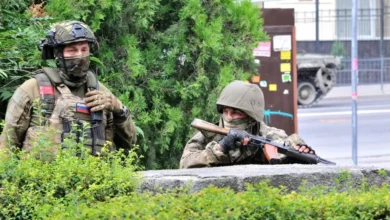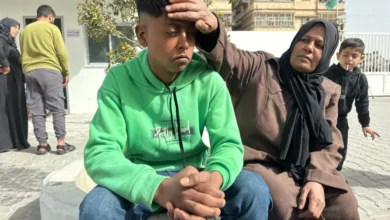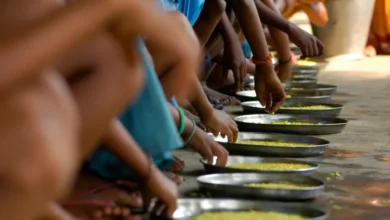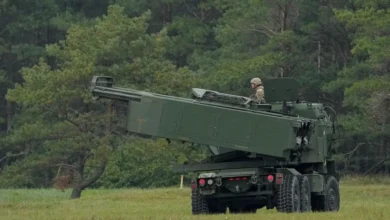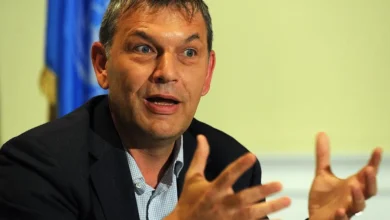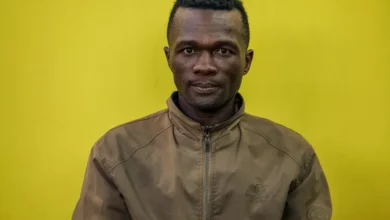Folk music and raids: How ultranationalists target migrants in Russia
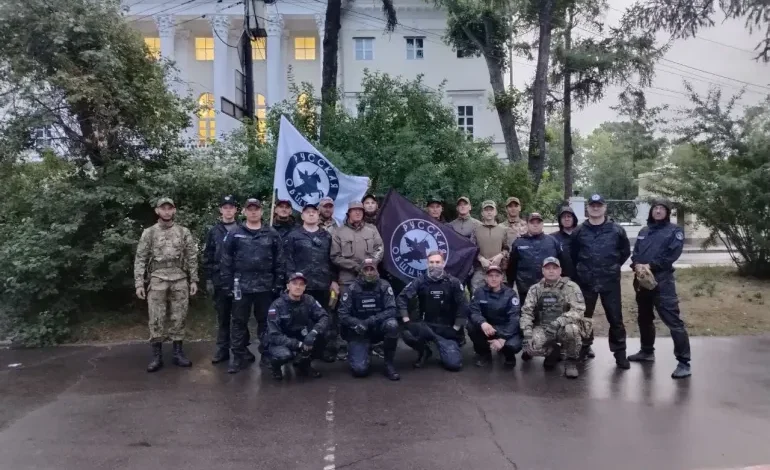
A group of uniformed men, at least one of them masked, walk up to a pair of watermelon sellers in a street on the outskirts of the Siberian city of Novosibirsk. The men are dressed in black, wearing tactical vests with patches bearing the emblem of a bogatyr – a mythic warrior of Slavic folklore – riding on horseback.
They inform the traders, who they believe to be foreigners, that they are trading without a permit, and the black-clad men help load their goods into a van to be confiscated by the authorities.But these men-in-black have no official position in law enforcement.
A video of this operation was uploaded online on Monday morning by the Russian Community, or Russkaya Obshchina (RO), who boasted of shutting down an “oriental bazaar”.
Since the invasion of Ukraine, the RO has become the largest and most influential ultranationalist organisation in Russia, with 1.2 million subscribers to its official YouTube page and more than 660,000 readers on its main Telegram channel, as well as its own app, and enjoys support from powerful allies within the clergy and security services.
“This is a classic movement of Russian ethnic nationalists,” says Alexander Verkhovsky, director of the SOVA Centre, which monitors hate movements in Russia.
“There used to be [the slogan] ‘Russia for Russians’, but now that is considered too radical. But in essence, this is what it is about,” he says.
RO also claims to stand for conservative moral and religious values, and steadfastly supports the Kremlin, including in its invasion of Ukraine.“These points define their entire ideology… There have always been nationalists, but the fact that the largest and most prominent Russian nationalist organisation is fully loyal to the government – this is an unusual situation.”
NovosibirskFolk singing and a stream of anti-immigrant messages
RO was founded five years ago by Omsk politician Andrey Tkachuk, anti-abortion rights activist Yevgeny Chesnokov and Andrey Afanasyev, a host on the TV channel Spas, which is owned by the Russian Orthodox Church.One member told the BBC last year that the idea was to create solidarity among Russians themselves, as other, tightly-knit ethnic communities in Russia already look out for each other, for example, Chechens or Armenians.
As such, many of the Community’s activities are benign: Helping each other out with flat tyres, or organising festivities on Orthodox holidays such as Maslenitsa (Butter Week), with folk singing and dance performances in the run-up to Easter.
But an examination of RO’s various Telegram groups reveals a narrow focus on ethnic Russian interests, to the exclusion of Russia’s other non-Slavic groups – although there are a handful of minority members – and a stream of anti-immigrant content.
“The blacks will devour everything in their path if the Slavs do not unite to somehow defend their borders and values,” a young female follower of the Community’s Saratov branch, who can’t be named for fear of repercussions, told Al Jazeera, using a derogatory slur.
The group’s other activities include vigilantism, often with the open or tacit support of the authorities, observers say.
According to Verkhovsky, there are a number of tactics to target immigrants and other minorities. One is filing official complaints and making denunciations to authorities against what it deems immoral, such as homosexuality or abortion or “Russophobic behaviour”. Neither of the former are technically illegal in Russia, but there are laws against “propaganda” related to LGBTQ and “childfree” themes.
Another tactic is raids, such as the one on watermelon sellers in Novosibirsk. “In the case of migrants, these are places where migrants live or work,” Verkhovsky explains.
Members of the Russian Community or similar vigilante groups, for example, the smaller group Northern Man, typically appear where immigrants are working and find some sort of “violation” – in the case of the Novosibirsk watermelon stall, unlicensed trading. They then detain the alleged violators and hand them over to the police.“In principle, more or less any citizen can complain to the Russian Community and say he’s been offended by some ‘bad’ people,” says Verkhovsky.
“Ideally, these ‘bad’ people are not Russian, and the person complaining is Russian. And then the Russian Community will go to protect him.”
Sometimes, the group accompanies police on joint operations as “volunteers”, though this is rarer. Verkhovsky noted that attitudes towards RO by different police departments vary, and, while some seem to welcome the group, in other cases, officers have brought charges against Community members – only for prosecutors to drop them.
